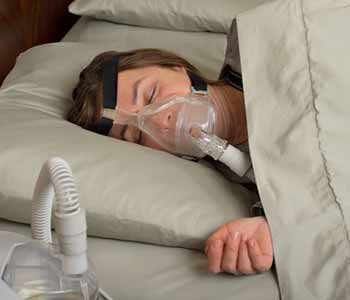The dentist’s office may seem like an unlikely place to treat daytime fatigue, snoring, and headaches, or to prevent high blood pressure, diabetes, and liver problems. These symptoms and potential complications are associated with sleep apnea. While this medical condition can be treated effectively with continuous positive airway pressure therapy, sleep apnea service in Nashua at the office of Dr. Amanda Smith offers an easy-to-use way to restore your health and quality of life.

How dentists treat sleep apnea
During sleep, the muscles and tissues in your throat and mouth relax. Sagging tissues cause your airway to narrow. Air can’t flow in a healthy manner. Among patients with the most common form of sleep apnea, obstructive sleep apnea, oral tissues may become so relaxed that they completely block your airway. In an act of self-preservation, your oxygen-deprived brain panics and wakes up your body. It’s from this moment of panic that some telltale signs of OSA emerge, such as sudden waking with a loud gasp, grunt, or snort. This process of sleeping and waking with a start is repeated over and over, sometimes hundreds of times a night. As the airway narrows, the speed of airflow also increases and causes tissues to vibrate. The resulting rattling and rumbling is characteristic of snoring. While snoring doesn’t necessarily mean you have sleep apnea, up to half of the reported 80 million North Americans who habitually snore do so secondary to OSA.
Due to the nature of sleep apnea, some of its effects can also show up on your teeth and in your mouth. These effects may be spotted by Dr. Smith during your check-up.
- Chips or excessive wear – Red flags for night-time tooth-grinding or bruxism, not all patients who grind their teeth during sleep have OSA. But, OSA is considered the highest, sleep disorder-related risk factor for bruxism. For this reason, dentists will thoroughly screen for conditions like OSA when treating patients who are also suspected bruxists. When OSA is effectively resolved, the symptoms of bruxism are also resolved, and teeth are protected from further damage.
- Temporomandibular Joint Dysfunction – Disorders related to the joint that connects the jaw to the skull cause all sorts of oral problems, including radiating facial pain, and trouble opening and closing your mouth. Patients with sleep apnea tend to have TMJ symptoms, as bruxism, depleted oxygen levels, and loss of REM sleep trigger joint and muscle pain.
Patients with sleep apnea may complain to their dentist about frequent dry mouth or sore throat. Patients who are diagnosed with sleep apnea no longer have to wear an uncomfortable mask connected to a noisy CPAP machine. While the effectiveness of CPAP isn’t questioned, compliance is low. What good is a treatment that isn’t used? Just as your dentist has unique insight into the oral effects of sleep apnea, so does he or she offer an alternative treatment to CPAP.
Restful sleep, better health in a dental appliance
Have you ever worn a sports mouthguard or Invisalign “braces”? In some respects, sleep apnea treatment prescribed by your dentist is not much different than other appliances worn in your mouth. These particular appliances are designed to address the root cause of your OSA symptoms: overly relaxed tissues that block the airway. By repositioning your jaw or tongue, oral appliance therapy for sleep apnea prevents obstruction, so your airway remains clear. Each patient’s device is customized to his or her needs, for comfort and effective treatment. Unlike CPAP machines, you can easily transport your dental appliance in your luggage. They’re easy to care for, and there is no need for costly, specialty products to maintain your device.
Made from quality materials, oral devices are durable. Nashua Cosmetic and Restorative Dentistry will regularly check your appliance for proper fit and assess signs or symptoms. Like all treatments, oral appliance therapy isn’t for every patient diagnosed with sleep apnea. But, many patients have transformed the quality of their lives by transforming their sleep with these specialized dental appliances. Schedule a consultation with Dr. Smith by calling (855) 363-3793 today.








